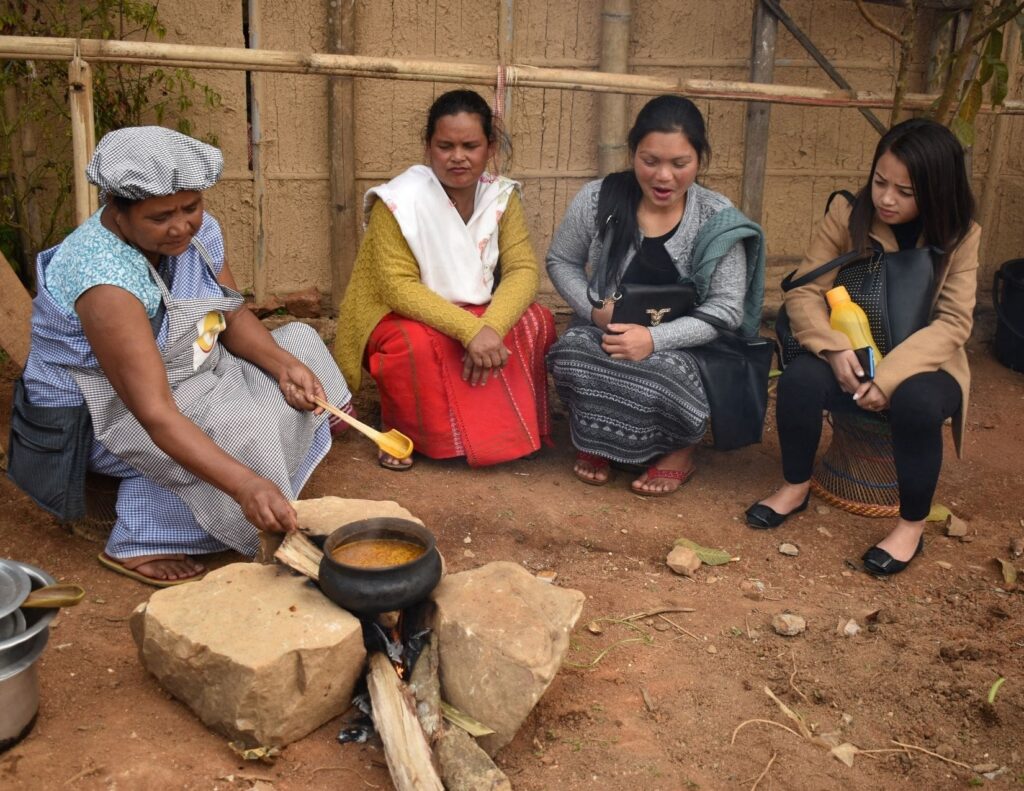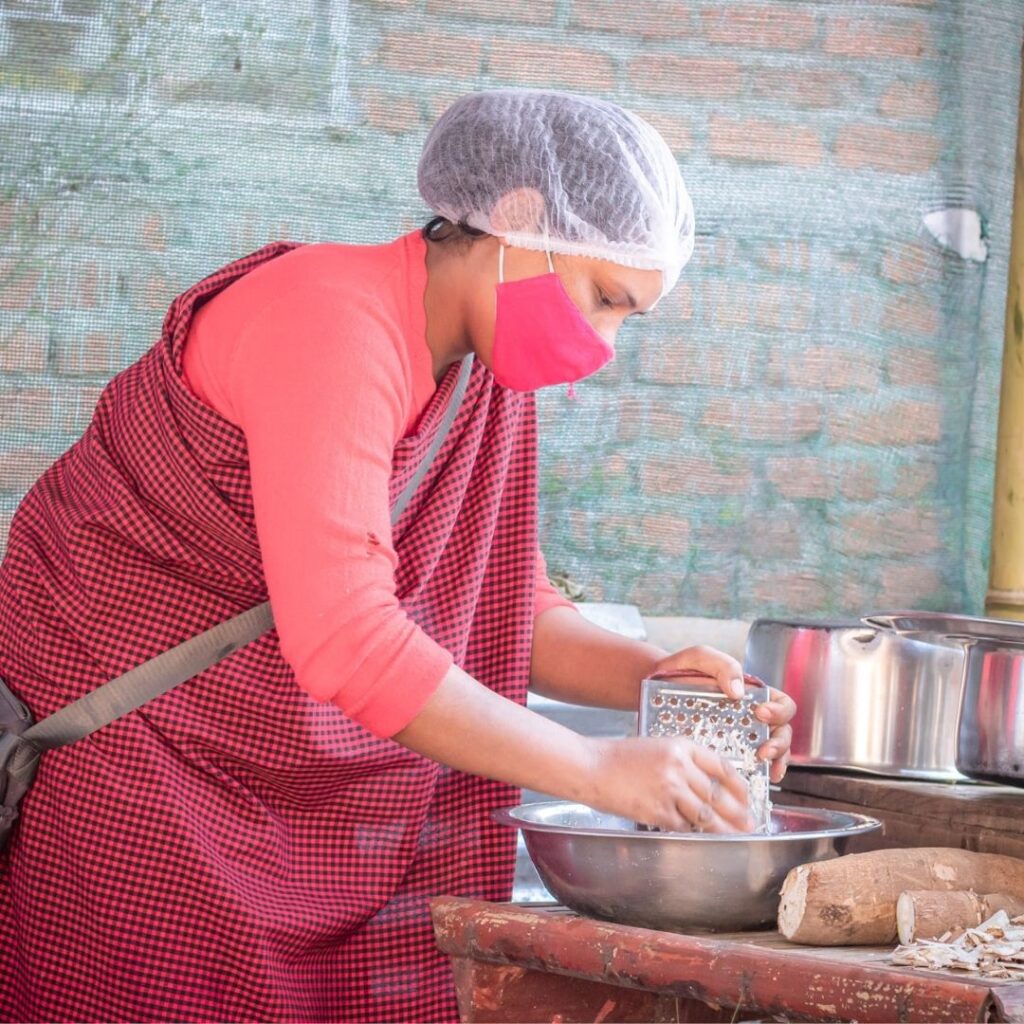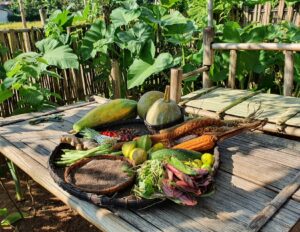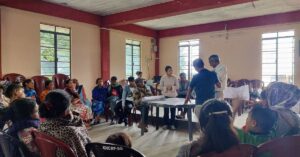Currently, 75 percent of the world’s food is generated from only 12 plants and five animal species despite around 250,000 to 300,000 known edible plant species in the world and 150 to 200 species already being used by humans for food. An implication of this increasing homogenization has been the continued marginalization of what are known as NUS or Neglected and Underutilized Species, many of which are highly nutritious and have great potential for adaptation to climate change. According to Stefano Padulosi, Phrang Roy and Francisco J. Rosado-May in their 2019 report ‘Supporting Nutrition-Sensitive Agriculture through Neglected and Underutilized Species – Operational Framework’ the term NUS was firstly developed by the International Plant Genetic Resources Institute/IPGRI (predecessor of Bioversity International) to refer to plant species (wild, or semi- or fully domesticated) left at the margins of R&D. ‘Neglected’ underlines the low level of research investments made on them when compared with mainstream commodity crops, whereas ‘underutilized’ alludes to their untapped livelihood potential. In Meghalaya, these refer to the many traditional food plants (both wild and cultivated) that are found to be part of the Indigenous Peoples’ Food Systems but have become marginalized over the years.
The 2018 participatory mapping exercise cum Dietary Diversity Score (DDS) Survey undertaken by NESFAS/North East Slow Food and Agrobiodiversity Society in 32 villages of Meghalaya and Nagaland revealed that while the local indigenous communities still habour a great deal of agrobiodiversity – an average of more than 200 food plants per village, the dietary diversity was very low, i.e., daily diet was homogenous and lack many food groups, especially food rich in micronutrients. This could have devastating repercussions for the food security and food sovereignty of the communities apart from making them highly vulnerable to climate change. To counter these threats, making NUS or traditional food plants (which includes wild edibles) part of the general narrative is an important strategy. These food plants are an integral part of local cultures and are increasingly in the spotlight of efforts for revitalizing local traditional food cultures. In this regard the efforts of Kong Plantina Mujai and Kong Dial Muktieh to promote traditional Bhoi-Khasi cuisines through their Mei-Ramew Cafés are highly noteworthy.
The Mei-Ramew Café is an indigenous café and a community owned food enterprise promoted by NESFAS that serves local food and encourages innovation in local recipes with maximum use of locally available ingredients. Kong Plantina and Kong Dial are residents of Khweng (a village in the Bhoirymbong C & RD Block) and have been running their own food shops for many years now. Kong Plantina, the senior of the two, began cooking and serving food in 1992. Initially the shop was located at the spot where people from Mynri (a neighbouring village) would gather with their polo (bamboo baskets). With the coming of the road, she shifted her shop to the present location, near the taxi stop. In spite of changing the location, customers continue to come to her shop because they enjoy the traditional dishes made from local ingredients. Kong Dial initially entered the food business by preparing food at home and selling it to the other shops and households in the village. But when she got married, she decided to set up her own food shop.
While both Kong Plantina and Kong Dial are now cooking and serving exclusively traditional foods, they did not begin as such. Kong Plantina’s first business was getting goods from the village to sell in the market and the other way round. In those days, barter was the main mode of transaction. People from the community would bring local rice and in return she would give them the vegetables and charcoal she had got from the market. Sometimes she would also bring rice from the market to sell in the village. Gradually, she veered towards the food business which she has been continuing since. Kong Dial, on the other hand, began with the food business but was selling both traditional and non-traditional snacks like samosas, long, momo etc., for which she got the training from RRTC (Rural Resource and Training Centre), Umran. With NESFAS’ intervention, she shifted her menu to more local centric food. She now serves traditional foods exclusively.

True to the matriarchal tradition of the Khasis, it was the grandmothers who taught Kong Plantina and Kong Dial to cook traditional dishes. When she was 13 years old, Kong Plantina had gone to stay with her grandmother in Syntiewmaw, her ancestral village. It was here that her grandmother taught her to cook traditional dishes and collect wild foods from the forest. Similarly, Kong Dial was taught to cook by her grandmother who was known to be an excellent cook in the village. However, with age, her eyesight began failing and she could teach her granddaughter only through instructions. Impressed by the cooking her grandmother encouraged Kong Dial to start her own food shop. In a manner, the respective Mei-Ramew Cafés are homage to their grandmothers who had passed the baton of tradition to their granddaughters.
Though both Kong Plantina and Kong Dial are adept at traditional Bhoi-Khasi cuisines, they have been making innovations in order to add variety to the menu and cater to the demand of their customers. In the past, wild edibles would be cooked only with ktung (dry fish). Now, Kong Plantina serves them with pork and taro. Recently, she has started preparing and selling ice cream made of jajew (Roselle – Begonia spp.), tamarind and soh shang (wild olive or bastard oleaster). Similarly, in order to make phandieng (tapioca) more palatable to her children, Kong Dial came up with the idea of a phadieng cake during one Christmas which subsequently became quite popular in the village as well. She is also skilled with cooking in bamboo tubes known as tyndong. The mushroom rice prepared by Kong Plantina and Kong Dial is also known to be out of this world. Over the years, both have made more than dozens of such innovations.

One of the important ingredients in all the dishes that Kong Plantina and Kong Dial prepare are wild edibles, gathered from the home gardens, paddy fields and the forest. The report ‘Supporting Nutrition-Sensitive Agriculture through Neglected and Underutilized Species – Operational Framework’ mentions NUS like wild mango in India and African leafy vegetables like spider plant, jute mallow and nettles as having excellent nutritional values and being high especially in Vitamin-A and iron. In this context, Kong Plantina has an interesting story about the nutritional and medical properties of jamahek (Rhynchotechum ellipticum). Sometime ago, one of her relatives was admitted in the hospital and was informed that he needed a blood transfusion. Since the family was financially weak, he was brought back to the village. At home, the grandmother asked the family to make the young man eat jamahek regularly in his meals. Very soon he recovered completely without requiring going back to the hospital.
Kong Plantina and Kong Dial have been part of NESFAS’ Mei-Ramew Café initiative, the former especially since 2013. After having adopted the concept, Kong Dial also renamed her shop as Dial Muktieh’s Mei-Ramew Café in 2019. In the past they had received training from RRTC with MBDA (Meghalaya Basin Development Authority) and ICAR (Indian Council of Agricultural Research) also providing them support in the form of training and platform to sell their food. Kong Dial, in fact won the first prize during the 2022 International Women’s Day celebrations organized by ICAR-KVK. The local MLA, Bah George Lyngdoh, also gave her financial support for fixing the roof of her café. During the 2022 SHG Mela organized at Bhoirymbong, both Kong Plantina and Kong Dial were invited to sell their food.
In the context of Meghalaya, traditional foods or NUS are important in the Indigenous Peoples’ Food Systems which has great potential to tackle not just the problem of malnutrition but also climate change. This was globally acknowledged when the ‘Insights on sustainability and resilience from the front line of climate change’ which is a case study from Meghalaya won the 2021 Best in the World Sustainability Report Award. The Mei-Ramew Cafés of Kong Plantina and Kong Dial are important interventions in that regard to be supported and emulated.
P.S: Kong Plantina Mujai and Kong Dial Muktieh also take orders for catering. Those interested can reach them in their village (Khweng) or contact NESFAS.
This article was originally published in The Shillong Times.



